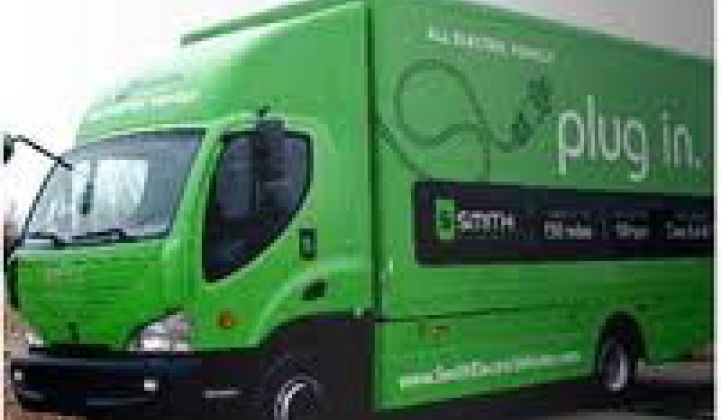Smith Electric Vehicles Corp. filed for an IPO on Thursday, seeking to raise up to $125 million on the Nasdaq to help pay down debt and build its base of customers that are looking to electrify their commercial transport fleets.
Consider it a workingman’s version of Tesla Motors. The Kansas City, Mo.-based company has been building its battery-powered electric Newton trucks since 2009, aiming squarely for the commercial fleet market. So far it has landed customers including DHL, FedEx, Coca-Cola, Frito-Lay and Staples, as well as contracts with the U.S. military.
The Newton costs between $80,000 and $90,000 in the U.S. if you include federal and state incentives, hauls as much as 16,000 pounds and goes from 50 to 150 miles per charge, which is suitable for many commercial fleets that can plan their routes and charging schedules in advance. It’s a heavier truck than most of the other electric work vehicles now on the market, like Ford’s Transit Connect electric van or Bright Automotive’s plug-in hybrid van, though Smith also has a lighter-duty Edison van that it’s selling in the U.K.
The company said in January that it was aiming to sell 1,000 vehicles this year. While it’s only sold about 320 over the past 12 months, it has reported that it has a 120-vehicle backlog and has “allocated nearly all or our estimated 540 production slots through July 2012,” giving a sense of both the demand for its trucks and its current manufacturing capacity.
In the long run, Smith hopes to sell 2,220 vehicles from 2012 to 2015 and is planning to make both lighter and heavier versions of the Newton available next year. The company sees a market of $40 billion in the medium-duty vehicle sector, in terms of all the traditional fossil fuel-fired vehicles it could supplant. Of course, less than 1 percent of the 150,000 light commercial trucks sold in the U.S. last year were electric, which shows just how far Smith and its competitors have to go to open that market.
As for its financials, Smith reported $21.3 million in losses on revenues of $37.6 million for the first half of 2011, compared to a $9.52 million loss on revenues of $15.8 million for the same period last year. For the past three years, the company’s losses have added up to $70.1 million on revenues of $90.8 million. The company also got a $32 million Department of Energy grant to get its customers to track how they use their EVs for research purposes.
As with most electric vehicle startups, Smith warns in its S-1 that it has yet to achieve profitability or positive cash flow, and that it still needs additional financing to carry out its growth plans. The company reported it raised $30 million in a private placement last month, part of which went to pay off the purchase of Smith’s electric van division from its parent company, U.K.-based Tanfield Group.



